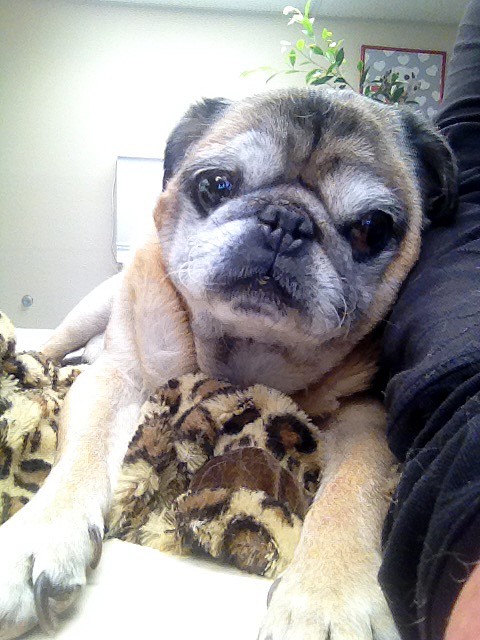Chief CFO, Ralph. Memorandum

2000-2016
April 19th, 2016, we said goodbye to our Chief CFO, Ralph.
Grieving & Coping
In Memory
They will not go quietly, the dogs who have shared our lives. In subtle ways they let us know their spirit still survives.
Old habits still make us think we hear them at the door. Or step back when we drop a tasty morsel on the floor.
Our feet still go around the place the food dish used to be, And sometimes, coming home at night we miss them terribly.
And although time may bring new friends and a new food dish to fill, That one place in our hearts belongs to them...and always will.
If you've shared your heart and home with a dog, you will no doubt feel a great sense of loss and sorrow when you lose them. No matter how old your dog was, how many years you had together, or how expected there death, the grief can be overwhelming.
No matter the time, the age, the circumstance, it always hurts to lose a pet you've loved. ~ Kimberly Rindhart
Coping with loss
Connect with people who understand. Dealing with your grief honestly can help you move through it. Try to ignore comments like, "It was just a dog." Dogs are family members, and it's entirely appropriate and expected that you would grieve the loss deeply. Avoid people who don't understand--they simply don't--and connect with other dog people who do.
Memorialize your dog if you think it will help. One way to work through your grief is to arrange for some kind of memorial. Whether that means a headstone, urn, or donation to a dog-related charity, a task that relates to your grief will make you feel better. Many types of headstones and urns are specifically designed for dogs.
Consider getting another dog. Many people have a strong opinion on this topic--and offer it unsolicited. "Get another right away" or "Wait a few months before do something impulsive" may be good advice. But most people prefer to come to their own conclusions in their own time. If you're the recipient of such advice, do your best to politely shrug it off; you'll know when the moment is right.
Dogs Grieving Another Dog
Sometimes the other dog or dogs in the household grieve so deeply that they stop eating, jeopardizing their own health. This is more likely to happen if the dogs had never been separated. If any of your dogs react to a loss so strongly they become ill, take them to the veterinarian. The pack has undergone a major transition, and it will take some time to adjust. Some dogs will perk up when a new companion arrives, while others acclimate just fine to their singleton status. Either way, take care to spend plenty of time with your remaining dog.
Dealing with someone else's grief
Dealing with someone else's loss is best done with tact, patience, and a willingness to listen rather than to speak. Most people don't like hearing, "I know just how you feel." It often sounds patronizing or condescending, even though you do mean it to. Better to say something like, "I know your dog meant so much to you."
Though it can be awkward to try to comfort someone whose pet has died, it's important to acknowledge that there was a loss. Numerous books deal with the issue, and they can make thoughtful gifts when a beloved dog has passed. One such classic is Dog Heaven, by Cynthia Rylant.
Bottom line: There's no getting around it: if you loved the dog, you're going to be sad--and the grief may last longer than you expect. Don't let others tell you how to feel or what to do; only you know what makes sense for you.
Saying goodbye
How do I determine when it's time to say goodbye to my elderly dog?
This is a very tough (yet very common) question, as it can be excruciating to say goodbye. You don't want to wait too long and prolong any suffering the dog is experiencing, but you do want to give her every chance for recovery. It's nearly impossible to not question your decision.
The bottom line is that you know your dog better than anyone else. If they have lost interest in the things that used to give them pleasure, that tells you that they may be in severe discomfort or pain. If meals, treats, walks, and affection were once a delight to them but now hold little enjoyment--or have even become unpleasant--that's clearly a sign.
We all hope to pass away peacefully, and no one should have to endure an agonizing death. If you feel that your dog is in uncontrollable pain, then know that euthanasia is actually a gift--a gift of relief from the pain and suffering. Remind yourself that sometimes euthanasia is the only compassionate response, and that should help make your decision easier.
Consult with your vet so that you understand the process of euthanasia. When grief may seem unbearable, knowing that your dog's suffering was minimal can help ease your own heartbreak.
The reality is that unlike your children--or anyone else you've helped raise and take care of--your dog will probably not outlive you. Even more sobering, you may end up facing a difficult decision about when to end the life of this precious friend and family member.
Some dogs do pass peacefully on their own, but in many cases, the will to survive keeps a dog going long past the point of experiencing good quality of life. While recent advances in veterinary medicine are nothing short of amazing, remember that just because you can prolong his life doesn't mean it's in your dog's best interest to do so.
Most of the factors around aging and death are beyond our control, but the one thing you are able to do for your dog is alleviate undue pain and suffering. Arguably, no other decision you make about your dog will be as difficult as the one to euthanize, but in so many cases, it is the only humane option.
How to know it's time
If there's ever a time to put your dog's welfare ahead of your own needs, this is it. While the idea of living without your beloved pet can be devastating, the thought of him suffering should feel even worse.
So in considering what to do, ask yourself the following questions:
* Does your dog have a terminal illness? Ask your veterinarian what to expect at the next stage and then ask whether you're prepared to go there.
* Is your dog in the kind of pain that cannot be significantly alleviated by medication?
* Will more treatment improve his quality of life, or simply maintain a poor quality of life?
* Can you afford treatment? End-of-life care can run into thousands of dollars, and people can end up prolonging their grieving while paying off credit cards.
* Is your dog so old he has lost most bodily functions? If he can no longer stand up, get down stairs, defecate, and urinate on his own, the quality of his life is pretty poor.
* Does he still want to eat? Once a dog loses his appetite he's signaling he's close to the end.
* Are his gums pink? When gums aren't a normal pink, your dog isn't getting enough oxygen.
* Is it in his best interest to extend his life, or are you extending his life for yourself? This last point is the most difficult one for most of us to sort out, but it may well be the most relevant.
Other considerations
* You may find that everyone feels free to tell you what to do, but the responsibility for this choice is yours. This can be more difficult when a couple disagrees, but it can still weigh heavily on a single person.
* Your veterinarian is trained to save lives. That's what they do, and that's why you go to them. But all they can do is delay, not prevent. No veterinarian should make you feel guilty for choosing not to pursue treatment, even if you can afford it.
* If your veterinarian is advising euthanasia and you're reluctant, closely examine your own motives and see if they're for your benefit or the dog's.
* People often say, "You'll know when it's time." In many cases that's true, but not always.
* Choosing euthanasia is not "playing God" any more than providing medical treatment to save a life is.
* Euthanasia ensures that you'll be able to be with your dog at the moment he passes, so he's not alone. However, you don't have to be there. If you feel you cannot remain calm, it's best for your dog that you not be there.
* Most people believe it's better to euthanize your dog a day too early rather than a day too late.
Make a list, or two
Before your dog gets to the point where euthanasia is a consideration, and you're still fairly calm, write a list of what gives him quality of life. Decide how many of those points he can be without in old age and still enjoy his life. For example:
* He likes to eat.
* He likes to play ball.
* He likes to go for walks.
* He likes to be petted by children.
* He is proud of his housebreaking.
* He likes large groups of people and dogs.
* He likes going for car rides.
That's seven points. How many points do you think your dog needs to enjoy life, even if he's not in pain?
If he can maintain quality of life with four of those seven, then you know it may be time to consider euthanasia if he gets to three points. Promise yourself that other factors, such as pain, the kind of senility that causes fear, and a lack of bodily function and control, cancel out any list.
Next, decide how much money you can afford to spend on veterinary care. Make a decision, write it down, and stick to your plan when your emotions are off the chart.
If your dog is suffering, he has lost all joy in being a dog.
Bottom line: The emotions surrounding this decision are mixed and complicated. To do what's best for our dogs, we need to realistically assess the criteria without allowing emotion to overwhelm the decision-making process.
Recent Posts
-
Pets Get Skin Cancer
Did you know pets get skin cancer too? Just like us, dogs and cats are susceptible to sun damage. Ex …Apr 4th 2019 -
Chief CFO, Ralph. Memorandum
2000-2016April 19th, 2016, we said goodbye to our Chief CFO, Ralph. Grieving & CopingIn MemoryThey …Feb 15th 2014


